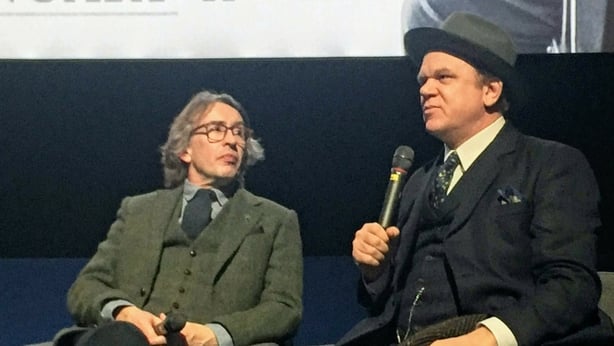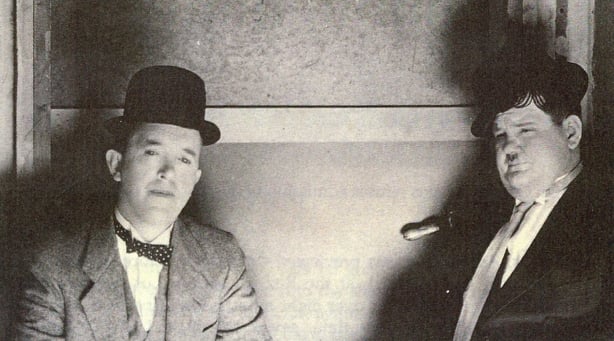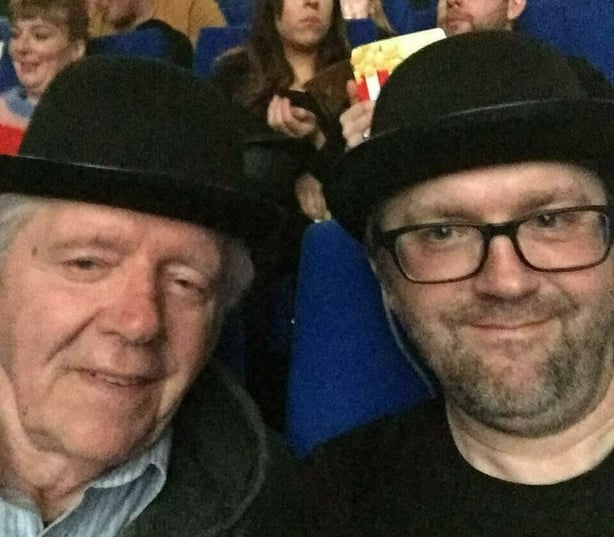In 1982, our household entered a new age with the arrival of our first VCR. We worshiped that Betamax player as it allowed us to watch the likes of Superman: The Movie and Blazing Saddles over and over and over again.
That Christmas I received a bootleg copy of The Empire Strikes Back from Santa. I noticed there was over an hour blank space following the final credits. Since blank video tapes were ridiculously expensive in those formative years, every minute you could eke out of a tape was precious. So with a heads up from my dad (who’d come across the listing in the RTÉ Guide), I earmarked that space to make my first proper home recording from the telly: Laurel and Hardy’s Way Out West.
Watch: Laurel & Hardy in Way Out West (1937)
My dad had the enviable joy of seeing Stan & Ollie live on stage when they toured Ireland in the 1950s. In fact, they came here several times. On their last tour, they checked into the Royal Marine Hotel in Dun Laoghaire for over a month. And ultimately, Dublin was to host their final performance together before they retired. Laurel & Hardy pictures were one of the few television choices our family never fought over. This was for one simple reason: they are genuinely hilarious. These days, it has been a struggle to convince my nieces and nephews of this, partially due to the prejudice towards black & white film that many generations have grown up with (I had the same problem getting them to watch any pre-colour Doctor Who stories).

Right now, however, we all can experience ‘The Boys’, as they were affectionately known, in full colour Cinemascope at your local multiplex. Stan & Ollie, starring Steve Coogan as Stan Laurel and John C. Reilly as Oliver Hardy, tells the story of this final tour of Britain and Ireland in 1953. It would be their victory lap as performers in a career as a team that began back in the heady days of silent films. Both Coogan and Reilly don’t simply do impressions of the boys - they inhabit their roles with great nuance, much the way Robert Downey Jr. did for Charlie Chaplin, in an Oscar-nominated turn back in 1992. While that particular bio-pic tried to cover far too much ground, resulting in a diluted film, the filmmakers here use the drama of a specific time, their twilight years, to show how their friendship and the audience’s affection for them endured, even with their glory years well behind them.
Watch: Laurel & Hardy's first screen pairing, in Lucky Dog (1921)
We are lucky that comedy’s greatest double act existed at all; by the early 1920s, Stan had all but given up performing to concentrate on writing scripts for legendary studio boss Hal Roach. But he wasn’t averse to stepping in front of the camera still if needs be. Such an occurrence happened on the silent short film Lucky Dog in 1921 (suitably titled, as it turned out) where Stan plays a penniless dog-lover robbed of his canine by a scruffy dog-napper, played by stock heavy Oliver Hardy - instant comedy gold! Well, not quite. It would take a couple of more shorts - and six whole years - before the boys would become fully-formed as the partners we know today in the short film Duck Soup (no relation to the Marx Brothers classic of the same name). It was clear to Roach (cameoed in Stan & Ollie by Danny Huston) with the success of this particular picture that they were onto something. He was right. The boys were no flash in the pan. This was proven across the no less than thirteen films they made in 1927 alone.

One of the reasons for the duo's longevity was that they managed to not only ride cinema's conversion to sound with their careers intact - but actually thrived and became even more popular. This was not the case for a lot of their colleagues. Many silent film stars either had weak speaking voices unsuitable for the nascent recording equipment, were European emigres with thick accents or simply failed to find their element away from the purely visual. Stan, with his mid-Atlantic Lancashire drawl, and Oliver with his deep southern gentlemen boom - he was a Baritone singer who had sung in church choirs since he was a boy - came into their own during the 1930s, and it was in this decade they made their most famous and successful pictures. Today, when you examine the screenplays that have survived, you realise how truly talented these men were. Some twenty minute shorts have only a three page script - everything else was hammered out on the day and improvised.
Watch: Laurel & Hardy's 1932 Oscar winner The Music Box:
Wiley Hal Roach always had the boys under separate contracts, so they could never really consolidate their success into a better financial position, one that truly reflected their popularity. It was this that ultimately led them to leave Roach’s studio in 1940 and sign a contract with Twentieth Century Fox. Alas, the money may have been better, but to do this Stan had to relinquish creative control over their films (he was head writer on the majority of their work) and the handful of resulting Fox pictures were not so memorable. Plus, World War II had changed the world, along with audience tastes. A new slam-bang duo by the name of Abbott & Costello were now all the rage. So, Stan and Ollie took to the road, touring Europe several times to continue to make a living. It’s on this last road trip, accompanied by their wives - played memorably in the new movie by Shirley Henderson and Nina Arianda - that we experience the boys' struggle with their faded popularity, when old wounds resurface as they try to put one final film together. You don’t stay together for more than thirty years without some lingering friction, but ultimately what matters to them is their friendship, their love and the comedy legacy they leave to the world.

Director John S. Baird’s Stan & Ollie is a truly heart warming film, with an impressive and moving screenplay by mega-fan Jeff Pope (he was nominated for an Oscar for writing Philomena with S&O star Steve Coogan). Don’t wait for it to just pop up on Netflix. Go to a picture house and experience the warmth and laughter with an audience at your shoulders. My dad was sitting next to me. Listening to him laugh was a sheer delight. The boys will forever be in our hearts.


